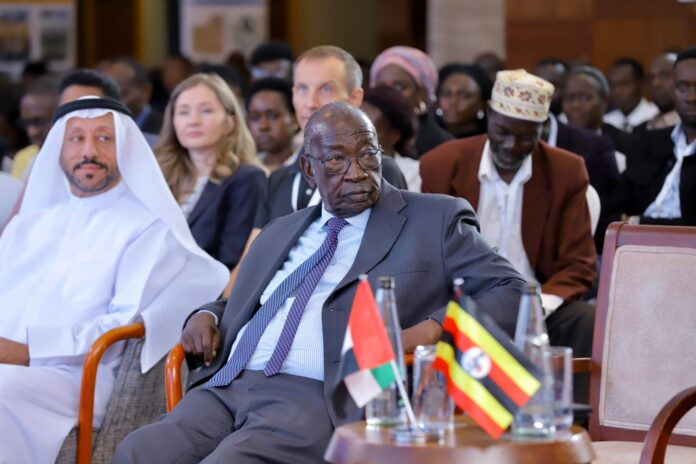
The growing trade relations between Uganda and the United Arab Emirates (UAE) hold immense potential to create lasting economic benefits for both nations, with Uganda emerging as a significant trade partner in the Middle East.
Uganda’s Minister of Trade, Industry, and Cooperatives, Francis Mwebasa, made the revelation during the UAE-East Africa Trade Mission Investment Forum at the Sheraton Hotel in Kampala on Wednesday, November 13, 2024.
“Uganda exported goods worth USD 2 billion, making it the biggest exporter in the Middle East,” he said, emphasizing the importance of Uganda’s role in the regional trade network,” Mwebasa said.
The Chairman of the Sharjah Chamber, Abdullah Sultan Al Owais, said that the commitment from the UAE side will further deepen trade relations.
“What we promised last year (2023) that next year, November 2024, we shall be here and we are here, and we hope that 2025 we shall be here again,” said Al Owais.
The Executive Director of the Federation of Small and Medium-Sized Enterprises, John Walugembe, highlighted the significant role these sectors play in Uganda’s economic landscape.
“Agriculture is a very significant contributor to Uganda’s economy with so many opportunities. Collaborating with investors will help take agriculture in Uganda to a greater level,” Walugembe said.
Read Also: Uganda Ranked as Leading UAE Investment Destination in Africa
Walugembe’s remarks underscore the potential for collaboration to unlock opportunities in agriculture, which constitutes 24% of Uganda’s GDP and accounts for 35% of the country’s export earnings.
He highlighted that in addition to agriculture, Uganda’s tourism sector is seen as a vital area for diversifying the economy. Walugembe urged learning from successful global models to boost the tourism industry’s growth in Uganda.
“The UAE has leveraged its tourism industry to diversify beyond its reliance on oil and gas. Uganda has similar growth potential that we should work to fully harness,” Walugembe stated.
The Executive Director of Kampala City Traders Association (KACITA) Uganda, Thadius Musoke, added that the growing investment climate in Uganda is also fueled by the government’s commitment to creating a conducive environment for business, emphasizing the role of public-private partnerships in driving economic development.
“As KACITA Uganda, we are advocating for the public sector to keep pace with the private sector to attract foreign investment. That is why we sometimes take a tough stance against corrupt officials who discourage investment,” Musoke explained.
The Director of the Uganda National Chamber of Commerce and Industry (UNCCI), George Inholo, underscored the incentives Uganda offers to attract foreign investors.
“Uganda offers unbeatable incentives for investors, including free land and up to a 10-year tax holiday,” Inholo said.
Inholo pointed to the growing bilateral trade between Uganda and the UAE, which has risen to $3.8 billion. This demonstrates the expanding opportunities for Uganda to export value-added products while attracting investment in key sectors like agriculture and tourism.
“We export a number of products, such as coffee, and also import products like equipment and machinery, which helps them grow as a business,” Inholo added, highlighting the mutual benefits of trade between the two countries.
As the UAE-Uganda trade relations continue to evolve, it is clear that the partnership is poised to have a lasting impact on Uganda’s economic development.














